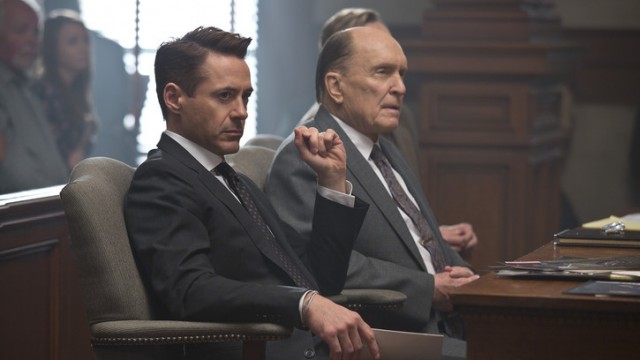Relics of the past adorn the first frames of The Judge, items meant to be deep symbolism by the end of the cinematic venture. For me, they hold no more meaning after 142 arduous minutes than they did once the film began, but truth be told, that’s not a specific knock at the worn baseball glove that opens the movie. Very little of The Judge is actually worth caring about, and those relics are easily some of the misfires smallest offenders in terms of failure.
Robert Downey Jr. has made a career out of being over-the-top, confident, charismatic, snarky yet lovable. And you know what? That personality is endearing, it works perfectly in press interviews and many of his films. But his best recent features (like the first and third Iron Man movies and Tropic Thunder) add some depth to that personality, subverting it in some fascinating way. The Judge does manage to wring nuance out of Robert by the end of the proceedings, but he manages to leave a tremendously negative impact on the film.
Perhaps I’m reading things wrong here, but it seems like the screenwriters made sure that everyone else in the film had to be as over-the-top as Downey Jr., who plays Hank Palmer. So the disgruntled Dad of Hank Palmer, Joseph (played by Robert Duvall) isn’t just a curmudgeon, he’s an overtop curmudgeon, the kind who’ll mock his sons marriage to anyone within earshot. Billy Bob Thorntons rival lawyer can’t just be that, he also has to have a “Russian nesting doll” like shotglass he uses in court to drink water. That girl Hank used to date (played by Vera Famriga) in High School he reunites with decades later? She pretty much exists in the story for sex and exposition, but the film amps her character up by making her the center of a bizarre incest fueled subplot that has no effect on the actual story of the film itself.
That story I mentioned is actually a pretty simple one, Hank, the typical big-shot lawyer who hates his small hometown, returns home for a funeral, only to find out his Father might have murdered someone. That kind of story could easily become a compelling one, but the film delays the inevitable event (the climactic trial that’ll decide Josephs fate) by filling the film up with things like that incest plot, horribly executed instances of humor and all those overly-stylized characters. There in lies the primary reason I have a problem with most of the films characters being such broad stereotypes; they’re utilized so much in the plot for hefty “dramatic” moments, but when the supporting cast has zero depth, those dramatic moments crash and burn.
This projects poor mix of comedy and drama recalls director David Dobkins 2007 effort Fred Claus, though Dobkin does at least display momentary flashes of imaginative directing here (father and son Joseph and Hank are both introduced in the same manner; from the back) But he’s out of his realm here handling a film as poorly structured as this one. By the time the seventy-ninth dramatic contrivance has been utilized to move the plot forward (a random tornado is even put to use to keep the story moving), we finally get to that climactic courtroom scene. Credit where credit is due, Downey Jr. and Duvall give some moments of a stirring performance here and there throughout, but otherwise, it fares like the rest of the film; dull and aimless. A film like this sometimes gets remembered for Oscar glory, but the only thing I’ll truly take away from The Judge is that incest plotline.
I take that back, I’ll also remember Jeremy Strongs performance as Josephs younger brother, a character that seems to have been inspired by someone wanting to make Ben Stillers Simple Jack character into a legitimate dramatic entity.


